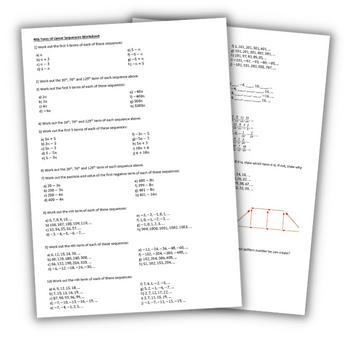These nth term questions worksheets contain material that is typically introduced at KS3. There’s also some content that is generally exclusive to KS4.
Assuming you’re introducing the sequence n = 1, 2, 3, 4, 5…, this nth term questions worksheet starts with simple sequences based on a single n.
Next we introduce multiples of n (Q3), then linear transformations of n (Q5).
Finding the nth term of a sequence
Q7 brings in some opportunities to develop reasoning. We then mirror the above approach in finding the nth term of a sequence in Q8-11. For example, nth terms based on a single n, then a multiple of n, then a linear transformation of n.
Q12 picks up sequences with missing values and reasoning with those. Q13 takes us into fractional sequences.
Q14 looks into more reasoning around whether values are in a sequence or not, before Q15 looks at a typical matchstick pattern.
Free GCSE maths worksheets
The practice questions on these maths revision worksheets have been designed to allow pupils to try all significant aspects of the content. They should also notice something about the structure behind each content area.
Students will need to engage in reasoning to explain why they’re seeing the results they are.
We’ve limited arithmetic to integer calculation so you can give these worksheets to pupils who may not yet be fluent in decimal/fractional arithmetic.
Where pupils have these pre-requisite skills, we recommend adapting the questions (where appropriate) to include this content.
You’ll be glad to know we’ve also included an answer sheet in the download.
Peter Mattock is an assistant headteacher and secondary mastery lead for the East Midlands South Maths Hub. He’s the author of Visible Maths and Conceptual Maths (Crown House Publishing). Follow Peter on Twitter at @MrMattock.
Download more arithmetic sequences worksheets and KS3 algebra resources.











